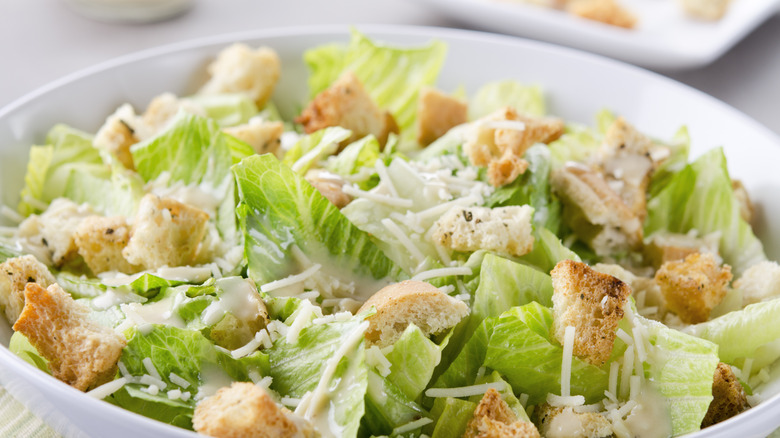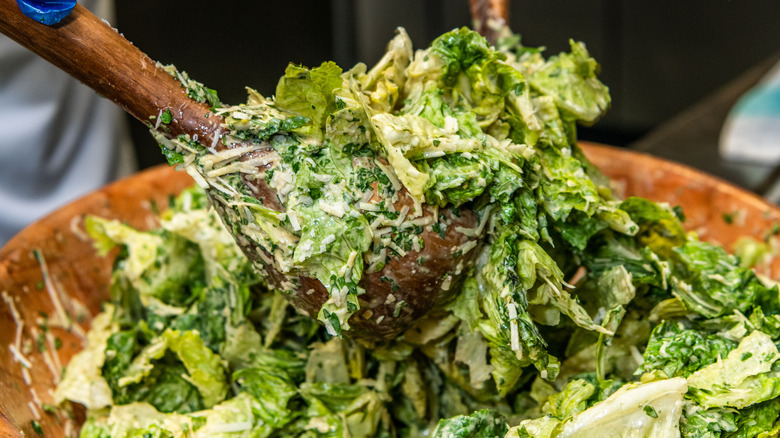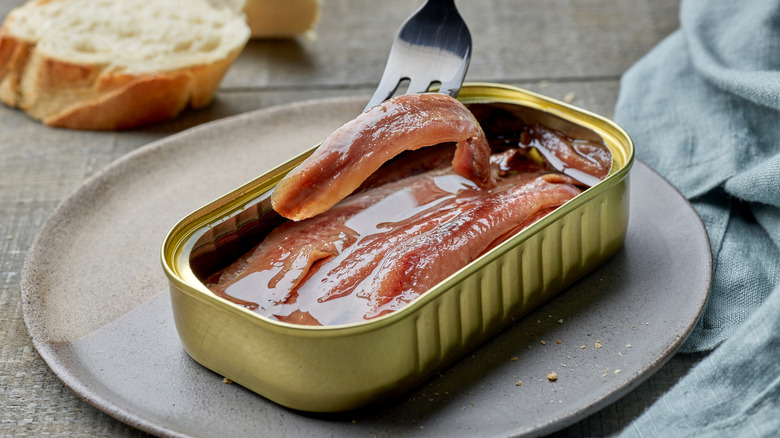The Original Recipe For Caesar Salad Leaves Out One Salty Ingredient
Making a homemade Caesar salad dressing can be a divisive act, and it's all due to one ingredient — the anchovy. Yes, those tiny fish that are packed into cans and sometimes end up on pizzas. Some people love them, but adding them to a Caesar salad can ruin the dish for fishy anchovy haters. But those haters might just be justified in this stance because the supposed original recipe remarkably omits anchovies.
For those who don't know, Caesar salad was not actually named after Julius Caesar, but another Caesar from the Italian peninsula, Caesar Cardini. Cardini was an Italian expat who settled in Tijuana in the 1920s and opened his own restaurant.
His daughter Rosa Cardini shared that on July 4, 1924, the restaurant was crowded with American patrons celebrating Independence Day. Overwhelmed, Cardini decided to whip something up with condiments and scraps from around the kitchen. This included olive oil, raw egg, croutons, parmesan cheese, Worcestershire sauce, and notably no anchovies. The resulting sauce was then served as a dip along with romaine leaves. It would later become a salad and an international hit.
According to this story, if you don't eat anchovies in your Caesar salad, you can now take a new stance. You don't hate anchovies; you're just a Caesar salad purist.
Mysterious origins
While Caesar Cardini's story is charming enough to be believed, it's also been highly disputed. One of Cardini's business partners, Paul Maggiora, also claimed to have invented the salad. Yet, another story is floating around: Livio Santini created the dish based on a recipe from his mother while working for Cardini.
The story that adds the most fuel to the Caesar salad fire is the claim that it was not Caesar but his brother Alex Cardini who invented the salad. Alex was a former Italian pilot, and when a crowd of American airmen entered the restaurant one night, he wanted to ensure they had a memorable experience. So, he whipped up a new dish known by some as Aviator's Salad. This take on the salad includes many of the same ingredients but chooses to include the anchovies missing from his brother's version.
If that wasn't enough evidence to show that the anchovy might actually have a place in Caesar dressing, it should be noted that the modern iteration of Caesar's Tijuana restaurant chooses to include the salty fish. The restaurant has changed hands from the Cardini family and gone through a substantial rebirth, but tableside Caesar salads persist and always include an anchovy.
The case for anchovies
Everyone's entitled to their personal tastes, but there is also a valid argument for including anchovies in a Caesar dressing recipe. If it's a favorite of chef Bobby Flay, it can't be that bad, right?
The same way they pack umami flavor into a tomato sauce, anchovies can add those same notes to your dressing. Anchovies are packed with glutamic acids that create an umami flavor, and can add those elements to a sauce or dressing. When added carefully to a recipe, all the more unpleasant elements of fishiness and saltiness that folks equate with anchovies will be masked by others, but that sensation of umami will persist.
There's even a good chance you've enjoyed a Caesar salad that included anchovies and didn't notice. As The Whaling Station chef David Stember told the Monterey County Weekly, a good Caesar salad should balance all of the ingredients that go into the dressing. "When it's correct, nothing stands out," said Stember.
Even with anchovies, if it's done properly, diners will enjoy a deeply savory and bright balance of flavors instead.


